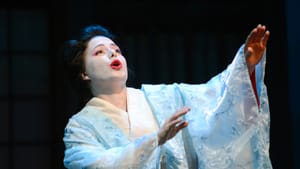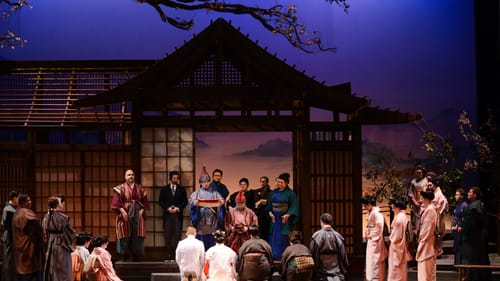Stay in the Loop
BSR publishes on a weekly schedule, with an email newsletter every Wednesday and Thursday morning. There’s no paywall, and subscribing is always free.
Screwing the Puccini
Princeton Festival presents Giacomo Puccini's 'Madama Butterfly'

When the Princeton Festival selected Madama Butterfly as its 2018 opera, many (including this reviewer) anticipated that director Steven LaCosse and conductor Richard Tang Yuk would bring something new to Puccini’s familiar, problematic tale of love, sacrifice, and cross-cultural misunderstandings. In recent years, interesting repertory choices and memorably idiosyncratic productions have made the festival a can’t-miss event for opera lovers around the Northeast.
Last season, LaCosse offered an interpretation of Beethoven’s Fidelio steeped in modern protest movements and the prison-industrial complex. Two years ago, he and Yuk (who is also the festival’s artistic director) transported Britten’s Peter Grimes to the 1930s, with England on the brink of entering World War II. In 2019, they will undertake their most ambitious challenge yet: a staging of John Adams’s contemporary masterpiece Nixon in China.
Common specimen
Perhaps Butterfly is a concession to conservative opera fans who feel maxed out on modernism and minimalism and find themselves craving something familiar. These considerations happen all the time in the arts. But I hoped LaCosse would at least find something new to say about this most evergreen of operas — not to mention tamp down the piece’s Orientalist elements.
No dice. From the moment the curtain of the Matthews Theatre rose on a shoji-screened house and wispily painted backdrop (sets by Wally Coberg), I feared what lay ahead. Whereas LaCosse’s Fidelio and Peter Grimes felt rigorous in their attempts to prove the contemporary relevance of those operas, Butterfly seems entirely thought-free, a passive entertainment that neither thrills nor moves.
In light of such reactionary choices, the opera itself suffers. Any thinking person recoils in horror at the story it tells, of a simple, submissive Japanese geisha — Cio-Cio-san, or Butterfly — willing to give everything, including her life, to the callous American soldier who marries her as a cultural curiosity. The proceedings become unpalatable when Butterfly’s choices lack agency or when a production relies too heavily on anachronistic tropes.
Thoughtful interpretations do exist. The Metropolitan Opera’s current production — originally directed by the late Anthony Minghella — draws from Japanese theatrical traditions, including bunraku and Noh, in accurate and respectful ways. It also downplays Butterfly’s subservience and makes her a more active participant in her own narrative.

Grounded wings
At Princeton Festival, Butterfly seems neither resigned to her fate or determined in her will. The fault partially lies in Yulia Lysenko’s well-sung but passively acted performance, which changes little from her character’s first entrance to her final suicide.
But LaCosse’s direction relies too heavily on stock gestures and predictable blocking. Costumes (by Marie Miller) and makeup (by Carissa Thorlakson) also feel exploitative, particularly with a non-Asian soprano in the title role.
Other performers fare better, particularly promising tenor Matthew White. A student at Philadelphia’s Academy of Vocal Arts, he imbues Pinkerton with a welcome mixture of insouciance and sensitivity. His voice remains a work in progress and could use more resonance, but he is surely an artist to watch.
Mezzo-soprano Janara Kellerman brings a quiet dignity to Suzuki, Butterfly’s devoted servant. Paul La Rosa finds sympathetic notes in American consul Sharpless, although his light baritone often fights the orchestra to be heard. Bass Wei Wu stands out among the supporting players as Butterfly’s disapproving uncle, Bonze.
Under Yuk’s baton, the orchestra experienced some persistent issues on opening night, including smudged transitions and coordination problems with soloists. But there was also a fair amount of distinguished playing to be heard. Sophie Bruno Labiner particularly excelled in the score’s extended passages for the harp.
Princeton Festival’s Madama Butterfly contains moments that suggest the interesting production that might have been. Lighting designer Norman Coates’s inventive use of shadow puppetry in several key scenes communicates more emotional weight than some entire stretches. But on the whole, LaCosse and Yuk give us a pinned Butterfly.
What, When, Where
Madama Butterfly. By Giacomo Puccini, Luigi Illica, and Giuseppe Giacosa; Steven LaCosse directed. Princeton Festival. Through July 1, 2018, at the Matthews Theatre, 91 University Place, Princeton, New Jersey. (609) 258-2787 or princetonfestival.org.
Sign up for our newsletter
All of the week's new articles, all in one place. Sign up for the free weekly BSR newsletters, and don't miss a conversation.

 Cameron Kelsall
Cameron Kelsall